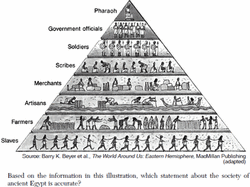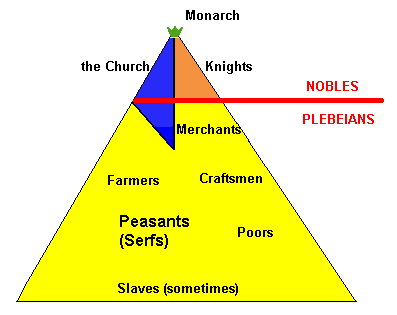
There are very different but simple classes to the social community of the Byzantine Empire just like how there were social classes in China and England. There is a lower, middle, and upper class level with minor classes within each class level. The upper class withholds the rich landlords, the wealthy beings, the government officials, and the ruler himself. The middle class includes merchants and stable landlords with smaller sized land. Lastly, the lower class contained beggars, clergy, peasants, farmers. People in the Byzantine Empire did not get to switch classes in life as it was set at birth. Your class was chosen by birth [heredity] not skill [merit]. Slavery was used by the upper and middle class for others to do their work. The slaves were usually the lower class and rarely the middle class. The slaves were usually exported Christian slaves placed into the Byzantine territories. As a citizen of the empire, the rights they had were based on the The Twelve Tables.
Here are some of the laws from the tables:
Quoted from http://www.csun.edu/~hcfll004/12tables.html
Here are some of the laws from the tables:
- I.1"If he (plaintiff) summon him (defendant) into court, he shall go. If he does not go, (plaintiff) shall call witnesses. Then only he shall take him by force. If he refuses or flees, he (plaintiff) shall lay hands on him. If disease or age is an impediment, he shall grant him a team (of oxen). He shall not spread with cushions the covered carriage if he does not wish to.
- II.3Whoever is in need of evidence, he shall go on every third day to call out loud before the doorway of the witness."
- III. 1"When a debt has been acknowledged or a judgment has been pronounced in court, 30 days must be the legitimate grace period. Thereafter, arrest of the debtor may be made by the laying on of hands. Bring him into court. If he does not satisfy the judgment (or no one in court offers himself as surety on his behalf) the creditor may take the debtor with him. He may bind him either in stocks or fetters, with a weight of no less than 15 lbs. (or more if he desires)." [After 60 days in custody, the case is returned to the court, and if the debt is not then paid, the debtor can be sold abroad as a slave, or put to death.]
- IV. 1 "A dreadfully deformed child shall be killed."
- IV. 2 "If a father surrender his son for sale three times, the son shall be free."
- V. 1 "Our ancestors saw fit that "females, by reason of levity of disposition, shall remain in guardianship, even when they have attained their majority."
- V. 7 A spendthrift is forbidden to exercise administration over his own goods.
- V. 8 The inheritance of a Roman citizen-freedman is made over to his patron, if the freedman has died intestate and has no natural successor.
- VI. 1 When a party shall make bond or conveyance, what he has named by word-of-mouth that shall hold good.
- VI. 2 Marriage by `usage' (usus): If a man and woman live together continuously for a year, they are considered to be married; the woman legally is treated as the man's daughter.
- VIII. 1 "If any person has sung or composed against another person a SONG (carmen) such as was causing slander or insult.... he shall be clubbed to death."
- VIII. 2 "If a person has maimed another's limb, let there be retaliation in kind, unless he agrees to make compensation with him." (Lex talionis)
- VIII. 21 "If a patron shall defraud his client, he must be solemnly forfeited (`killed')."
- VIII. 23 "Whoever is convicted of speaking false witness shall be flung from the Tarpeian Rock."
- VIII. 26 "No person shall hold meetings in the City at night."
- IX. 3 "The penalty shall be capital punishment for a judge or arbiter legally appointed who has been found guilty of receiving a bribe for giving a decision."
- IX. 6 "Putting to death... of any man who has not been convicted, whosoever he might be, is forbidden."
- X. 4 "Women must not tear cheeks or hold chorus of `Alas!' on account of a funeral."
- X. 6a "Anointing by slaves is abolished, and every kind of drinking bout....there shall be no costly sprinking, no long garlands, no incense boxes."
- XI. 1 "Marriage shall not take place between a patrician and a plebeian."
- XII. 5 "Whatever the People has last ordained shall be held as binding by law."
Quoted from http://www.csun.edu/~hcfll004/12tables.html

 RSS Feed
RSS Feed